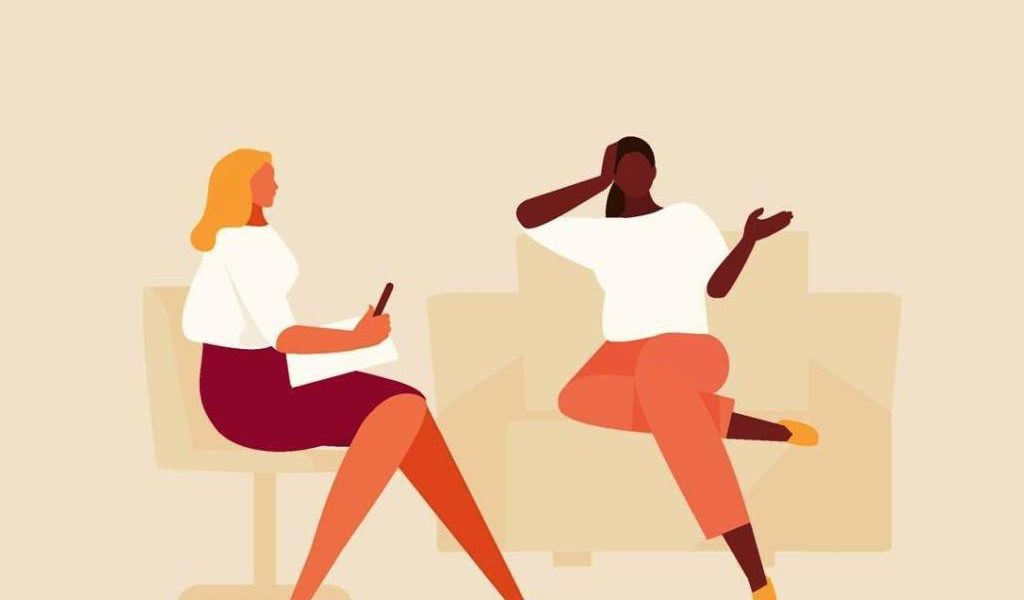Feeling overwhelmed and out of control? We’ve rounded up everything you need to know about seeking professional help
Admitting that you’re going, or have been, to therapy can still feel a bit taboo; I haven’t told many people that I had counselling after my mum died out of fear of what they might think of me, despite how much it helped me deal with my grief. But that shouldn’t be the case – there shouldn’t be any shame in admitting that you’re struggling and need some outside help. However, it can be hard to know where to begin, which is why I put these frequently asked questions about the process to the experts. From how therapy works to how to find the right therapist to suit your needs, these are the answers that can help you feel confident in taking that first step to start improving your life.
Firstly, what is therapy?
When I went to my first session, I wasn’t sure what to expect – would I have to lie on a couch and feel exposed as I talked about my grief? Luckily, that’s not the case, as Richard Reid, psychologist and founder of Pinnacle Therapy (pinnacletherapy.co.uk), explains. “Psychotherapy and counselling offer a safe, consistent and confidential relationship in which to explore and begin to understand the particular issues and difficulties that are currently affecting your ability to cope with the challenges of life. They can help you resolve emotional conflict, change negative thinking and behaviour, and support you in making positive choices.”
How do I know if I need therapy?
“There are lots of misconceptions about therapy, but one of the biggest is the idea that there needs to be something seriously ‘up’ in order to benefit from it,” explains Dr Elena Touroni, a consultant psychologist and co-founder of The Chelsea Psychology Clinic (thechelseapsychologyclinic.com). “The reality is, everyone can benefit from therapy. While it can also be helpful in a crisis, the earlier you seek the right help, the more beneficial it will be to you and your particular situation. There’s no “wrong” time to start therapy – but some general warning signs to look out for include difficulty sleeping, having very low energy levels for an extended period of time, not being able to concentrate, no longer enjoying the things you once loved, relationship difficulties and falling into the same negative patterns.”
If you think that you may benefit from therapy, the first thing to do is to speak to a friend or relative who you know won’t judge you and tell them how you feel, says Mark Newey, psychotherapist, author and founder of headucate.me. “If they try to give you advice, it’s best to politely decline. If they haven’t been through a mental health issue themselves, their advice is likely to be based on ‘pull yourself together’, however gently put and nicely meant. They’re just there to listen. For some people, talking about how they feel might be enough to move things on and change what it is in their life that’s upsetting them. After talking to them, you’ll be in a much better position to decide if you need professional help. If you decide you do, then don’t hesitate, start looking straight away. It’s easy to put it off – in many ways, putting your hand up and asking for help is the most difficult bit!” And it’s true – it was only after talking to a friend that I realised I needed support, but it still took me a while to work up the courage to book my first session.
How can I find the right therapist for me?
“It’s important to find a therapist who is qualified and accredited,” warns Richard. “Most credible therapists will be members of one or both of the professional organisations for therapists, the UKCP (United Kingdom Council for Psychotherapy) or the BACP (British Association for Counselling and Psychotherapy). Once you’ve made sure that your potential therapist is adequately qualified, the most important thing is fit. Counselling and psychotherapy are not like other branches of medicine or healthcare, what is important is that you like your therapist and feel you can work with them. The best advice is to go with your gut, and if you would prefer a male or female therapist then that is clearly important. Similarly, if you would like to explore identity issues and would rather work with a black therapist, a therapist who speaks your mother tongue, or a therapist who shares your sexuality, it’s important to listen to your feelings. While for some clients theoretical orientation is important, and finding a therapist who has a background in trauma, or psychoanalysis or CBT (cognitive behavioural therapy) is paramount, what is really important is that when you sit down with your therapist you think, ‘yes, I can work with this person’. If you don’t, they’re probably not the right therapist for you.”
What will the first session be like?
“The initial consultation is a chance for you and your therapist to get to know each other better,” says Dr Elena. “Starting therapy with an idea around what you’d like to get out of it can be helpful but if you’re not sure, that’s fine too. Coming prepared with a few questions can help but it’s not expected of you. You could ask about the type of approach to counselling your therapist works with, whether they’ve helped anyone else with your issue and how many sessions they think you’ll need.”
What if I can’t afford therapy?
“Not everyone can afford a private therapist,” says Richard. “If you’re trying to access low-cost therapy, there are a number of options available to you. The first port of call should be your GP. Many GP practices have therapists attached to them nowadays, and although there are often waiting lists, most people will be able to access shortterm counselling, between six and 10 sessions, via their GP. If not, the next thing to do is to contact your local branch of the mental health charity MIND. There is usually a branch of MIND in each county or London Borough, and many have their own counselling service which offer up to 20 sessions of low-cost therapy. If there is no counselling service, they will have information on what counselling services operate locally. Also, consider your own status: many counselling services are tailored towards specific groups in the community, from black and Asian counselling services, to those for older adults, the bereaved, teens, the lesbian and gay community and services serving those with specific health or addiction problems. A Google search will soon bring up those services active in your area, or call your local branch of MIND for help with finding these targeted services.”
Top tips
Thinking about trying therapy? Follow this helpful advice from psychotherapist Lauren Callaghan, author of How Can I Help? (Trigger Publishing, £12.99).
- It’s OK to shop around – going to therapy is a big step and having a good relationship with your therapist will help you make progress. If you do not have a good rapport with your therapist, it is OK to try another one (although please don’t just change therapist because you don’t like what they are saying. Sometimes they need to tell you things that are hard to hear but may be true and necessary for positive change).
- Speak to the therapist first on the phone so you can get a feel for how they work and ask them about their experience and qualifications.
- It’s OK to feel strange or apprehensive about therapy – it’s a big step for anyone. Don’t worry if you are anxious about starting, and it might take a couple of sessions to get a rhythm going with your therapist.
- Just because you don’t feel better straight away, doesn’t mean it is not working. Most problems will take time to start resolving, and therapy needs some time to work. If you are still unsure, speak to your therapist about your concerns.
- There is no perfect time to start therapy – therapy is there for the imperfect times. Don’t delay starting therapy as it could help you feel better and live the life you want to live. Prioritise your mental health and wellbeing and treat it like an investment in yourself and your future.



















